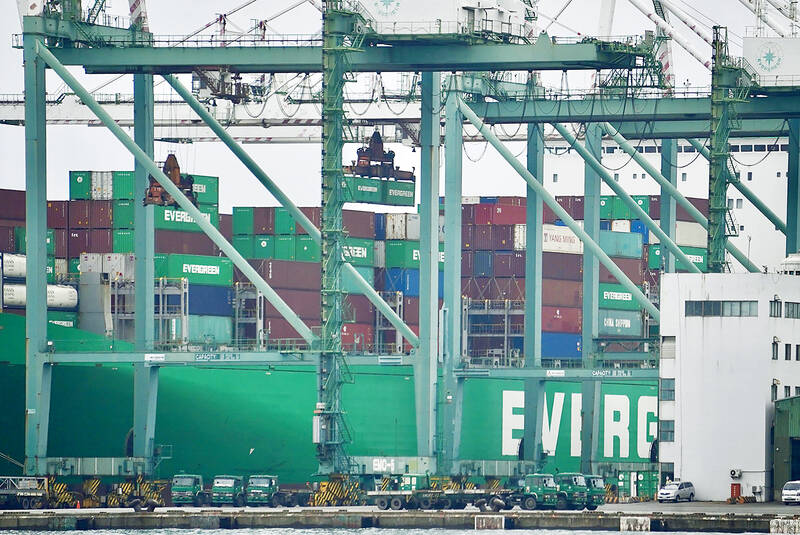The nation’s industrial production plunged 22.86 percent year-on-year last month, as semiconductor and flat-panel makers took a severe hit from prolonged inventory correction due to macroeconomic uncertainty, the Ministry of Economic Affairs said yesterday.
The index slid to 76.4 last month, hitting the lowest level in about four years after an 11-month losing streak.
The index of manufacturing production, a major contributor to industrial production, dropped 23.52 percent annually to 75.85 last month, which was also the poorest performance in about four years.

Photo: CNA
However, with the local supply chain inventory gradually improving since the beginning of this year, the manufacturing production index this month could pick up sequentially, the ministry said, adding that it expects the figure to climb 4.8 percent to 79.51 this month at best or decline 0.4 percent to 75.51 at worst.
“The semiconductor industry’s performance last month was a drag on manufacturing production because of inventory digestion in the supply chain,” Department of Statistics Deputy Director-General Huang Wei-jie (黃偉傑) said by telephone. “As the issue is likely to persist in the third quarter, the outlook for manufacturing production remains bleak.”
Taiwan Semiconductor Manufacturing Co (TSMC, 台積電) told investors last month that inventory adjustments would extend into the next quarter before rebalancing to a healthier level, one quarter longer than the company had expected, due to macroeconomic uncertainty.
On an annual basis, manufacturing production would continue its downtrend, falling between 21.1 percent and 25.1 percent this month, Huang said.
To better track developments in the local semiconductor supply chain, the department last month added chip designers such as MediaTek Inc (聯發科) to the index last month.
The production of electronic components plunged 31.1 percent year-on-year last month, with semiconductor and flat panels suffering the steepest decline of more than 33 percent each.
Computers and optical component production dropped 14.01 percent last month on weak demand, while servers and switches posted robust growth last month, it said.
Basic metals, mainly steel, fell 11.57 percent as manufacturers contended with sluggish demand and high inventories, while some used the downturn to undertake equipment maintenance, it said.
Petrochemicals contracted by 19.37 percent due to reduced demand, while machine tools plunged 24.72 percent as most companies slowed capacity expansion in response to a weak macroeconomy, the ministry said.
Automotive production slid 2.94 percent, the smallest retreat in the manufacturing segment, thanks to strong domestic demand, the ministry said.

PROTECTION: The investigation, which takes aim at exporters such as Canada, Germany and Brazil, came days after Trump unveiled tariff hikes on steel and aluminum products US President Donald Trump on Saturday ordered a probe into potential tariffs on lumber imports — a move threatening to stoke trade tensions — while also pushing for a domestic supply boost. Trump signed an executive order instructing US Secretary of Commerce Howard Lutnick to begin an investigation “to determine the effects on the national security of imports of timber, lumber and their derivative products.” The study might result in new tariffs being imposed, which would pile on top of existing levies. The investigation takes aim at exporters like Canada, Germany and Brazil, with White House officials earlier accusing these economies of

EARLY TALKS: Measures under consideration include convincing allies to match US curbs, further restricting exports of AI chips or GPUs, and blocking Chinese investments US President Donald Trump’s administration is sketching out tougher versions of US semiconductor curbs and pressuring key allies to escalate their restrictions on China’s chip industry, an early indication the new US president plans to expand efforts that began under former US president Joe Biden to limit Beijing’s technological prowess. Trump officials recently met with their Japanese and Dutch counterparts about restricting Tokyo Electron Ltd and ASML Holding NV engineers from maintaining semiconductor gear in China, people familiar with the matter said. The aim, which was also a priority for Biden, is to see key allies match China curbs the US

Teleperformance SE, the largest call-center operator in the world, is rolling out an artificial intelligence (AI) system that softens English-speaking Indian workers’ accents in real time in a move the company claims would make them more understandable. The technology, called accent translation, coupled with background noise cancelation, is being deployed in call centers in India, where workers provide customer support to some of Teleperformance’s international clients. The company provides outsourced customer support and content moderation to global companies including Apple Inc, ByteDance Ltd’s (字節跳動) TikTok and Samsung Electronics Co Ltd. “When you have an Indian agent on the line, sometimes it’s hard

‘SACRED MOUNTAIN’: The chipmaker can form joint ventures abroad, except in China, but like other firms, it needs government approval for large investments Taiwan Semiconductor Manufacturing Co (TSMC, 台積電) needs government permission for any overseas joint ventures (JVs), but there are no restrictions on making the most advanced chips overseas other than for China, Minister of Economic Affairs J.W. Kuo (郭智輝) said yesterday. US media have said that TSMC, the world’s largest contract chipmaker and a major supplier to companies such as Apple Inc and Nvidia Corp, has been in talks for a stake in Intel Corp. Neither company has confirmed the talks, but US President Donald Trump has accused Taiwan of taking away the US’ semiconductor business and said he wants the industry back